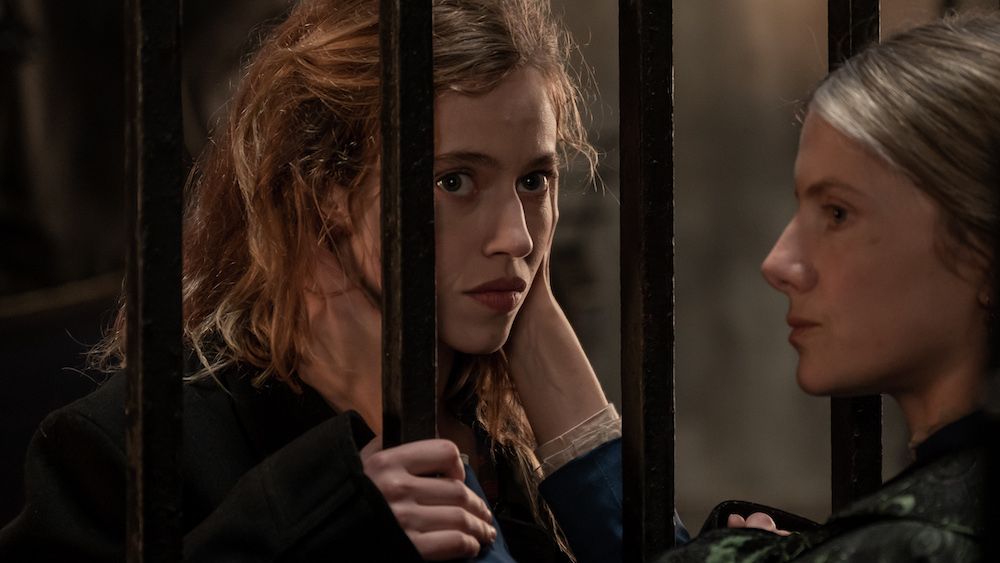Actor/director Melanie Laurent, best known for her role as Shosanna in Inglourious Basterds, creates an emotionally layered film about vulnerable women struggling to survive in the frightening lair of a 19th century psychiatric hospital where misogyny, fear and abuse runs rampant. Though the story takes place over a century ago, many of the misguided attitudes toward women are shockingly still present in society today.
Set in 1885, The Mad Women’s Ball tells the story of smart, free-spirited Eugénie Cléry (Lou de Laâge), a young woman both blessed and cursed to be from an elite Parisian family. Curious and eager for intellectual stimulation, Eugénie has no interest in being presented to society at a royal ball like the other women her age. She prefers to sneak away to bourgeois cafés and exchange ideas and books. When she’s not defying her uptight family, she hears spirits speaking to her. She doesn’t pursue the dead through seances or other means; instead, they use her as a vehicle to communicate from beyond.
Realizing that a rebellious young woman who talks to the dead won’t make a respectable wife, Eugénie’s father decides to lock her up at Paris’s Pitié-Salpêtrière, a neurological clinic where male doctors conduct horrifying experiments and abusive “cures” in the name of scientific advancement. Some of the women do have legit mental illness, but most have misunderstood ailments like epilepsy or are simply unwanted by their family, like Eugénie. All are considered “hysterical,” a 19th-century catch-all diagnosis given to any woman who was not docile or obedient.
Laurent also stars as Geneviève, the head nurse at the hospital who’s grieving the death of her sister. While Eugénie and Geneviève form a fragile bond, neither can escape the torment enacted on them by the male-dominated medical establishment.
The film is a beautiful yet searing portrait of female solidarity in the face of the misguided, controlling, often abusive men. The egotistical doctors at the hospital can’t seem to reconcile their sexual desire for the women with their underlying fear of them. The doctors bleed them, torture them under the guise of treating them, and force them to undergo painful gynecological exams only to build their own reputation in the name of medicine. Watching the film, I couldn’t help but see many of the same gut-wrenching themes play out in America in recent weeks. We’re talking modern America. 21st century America.
The first relevant theme in the film that’s in the news today is the idea of women being hysterical and the need by men in charge to censor or shut them down all together. Laurent told Variety in an interview, “I’m under the impression that the more power women have today the more they are called crazy or hysterical.” This is exactly what happened when gold-medal-winning American gymnasts, including Simone Biles and McKayla Maroney, tried to report sexual abuse from United States Gymnastics Association’s doctor Larry Nassar. The gymnasts recently testified before the U.S. Senate about how the FBI severely mishandled their abuse allegations. Maroney herself claimed that the FBI made “entirely false claims about what I said.”
The suffering of these young women was largely ignored for years by authorities, and just like in The Mad Women’s Ball, their voices were silenced or censored. One can’t help but ask the question: if the gymnasts were male, would they have been ignored?
The second theme from the film playing out today is control of a woman’s body. Women considered hysterical, like Eugenie, were often sterilized, taking away control of their reproductive rights. Sadly, reproductive rights for women are still an issue. The new abortion bill in Texas, known as the Texas Heartbeat Act or Senate Bill 8, says abortions may not be conducted after a fetal heartbeat can be heard, or at around six weeks – often before many women even know they are pregnant. The bill doesn’t take into account if the woman was raped or if the pregnancy was a result of incest. Not only does the bill not allow a woman to decide what to do with her own body, it also deputizes others – strangers even – to sue anyone involved in performing/receiving abortions after six weeks and offers financial incentives of $10,000 plus legal fees if they are successful. This law not only revokes female autonomy, but incites “bounty hunters” to gain financially if the law isn’t followed.
The third relevant theme in the movie that feels ripped from the headlines is the abandonment of vulnerable women and girls to ruthless authorities. Eugenie’s father and brother abandon her at the hospital like a stray dog, deeply betraying her. Just weeks ago, after American military forces spent two decades in Afghanistan trying to create a stable government, they pulled out of the country, allowing the Taliban to seize control. Already, women must cover their bodies, are forbidden from leaving the house without a chaperone, and in some areas, prevented from going to work. Whether or not Afghan girls will be allowed to go to school remains to be seen. It seems as if the Taliban are trying to make women completely disappear from society.
Laurent herself touched upon this in her interview in Variety. She says, “The world is changing fast these days, and it’s not headed in the right direction: We’ve left behind women in Afghanistan where they risk being raped every four seconds and everywhere in the world there are still women who are beaten to death.”
Could Laurent have known these shocking, heartbreaking events were going to happen? No. But could she have sensed an oncoming wave of oppression and misogyny in the zeitgeist? It’s certainly possible.
As a filmmaker, Laurent cleverly chose to make a film about these themes set in another time period to create some mental distance between the audience and the subject matter. The Mad Women’s Ball looks back at a time when society accepted that men controlled a woman’s every move to shine a light on how ridiculous it was to silence and stifle half the population. This is a powerful film that all women – and men – should see as we deal with the poor treatment of women and girls in our current, difficult times.
The Mad Women’s Ball is currently streaming on Amazon.



.JPG)